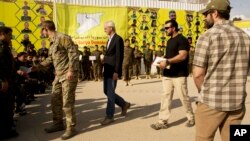A U.S. delegation is visiting northeast Syria to discuss the future of the region with Kurdish officials, months after U.S.-backed forces declared victory over the Islamic State terror group in eastern Syria.
U.S. and Kurdish officials said the visit is primarily to focus on stabilization efforts in the post-IS phase, as well as the fate of hundreds of IS foreign fighters who have been detained by Kurdish forces in Syria.
“The key is to help the Syrian Democratic Forces, the Syrian Democratic Council, with the issue of security, particularly as they transition from a focus on military operations to a focus on counterterrorism against (IS),” William Roebuck, deputy special envoy to the Global Coalition to Defeat ISIS, told reporters Wednesday following his meeting with local officials in the town of AinIssa in northeast Syria.
The SDF, a Kurdish-led military alliance, has been an effective U.S. partner in the fight against IS in Syria.
IS detainees
The SDF has been holding more than 2,000 IS foreign fighters from more than 50 countries since the collapse of the terror group’s self-declared caliphate in March.
The SDF has also processed tens of thousands of civilians linked to IS, including the wives and children of the foreign fighters, many of whom also come from outside of Syria and Iraq.
“The issue of the detainees is a serious one — it’s a security issue. We will work closely with our partners to ensure that people are held securely and humanely,” Roebuck said.
SDF officials have been calling on Western countries to take back their citizens, arguing that it can no longer keep these large numbers of individuals in their custody.
Earlier this month, the U.S. repatriated two American women accused of joining IS, along with their children.
Several European countries, including France, Norway, Sweden and Denmark, have also taken numbers of citizens held in Syria.
Improving services
Syria’s 8-year-long civil war and the fight against IS have devastated infrastructure in many parts of the country, particularly in northern and eastern Syria.
Lack of basic services and rising food prices have caused major protests in areas recently freed from IS militants, including the province of Deir el-Zour.
U.S. forces in Syria “want to strengthen our relations with the Syrian Democratic Forces and (Kurdish-led) Autonomous Administration, and we got a very good discussion today on the importance of restoring essential services to people and strengthen the security,” Roebuck said.
IS sleeper cells
Despite losing all of its territory, IS sleeper cells in Syria continue to pose serious threats to the region’s stability, local officials said.
“The U.S. and international coalition still have an important role to play in this region after defeating IS militarily,” said Kamal Akif, a spokesman for the Kurdish-led administration in northeast Syria.
“That’s why the visit of Ambassador Roebuck and his delegation is so important to us. It shows that the U.S. is serious about eradicating IS terror not only militarily but also ideologically,” he told VOA in a phone interview.
U.S. stabilization efforts have focused on rebuilding essential infrastructure, removing land mines left behind by IS, and training local forces in areas such as Raqqa, the former de facto capital of IS.
Since the start of the civil war in 2011, the U.S. has provided more than $8.6 billion in humanitarian assistance for Syrians displaced inside Syria and the region.




